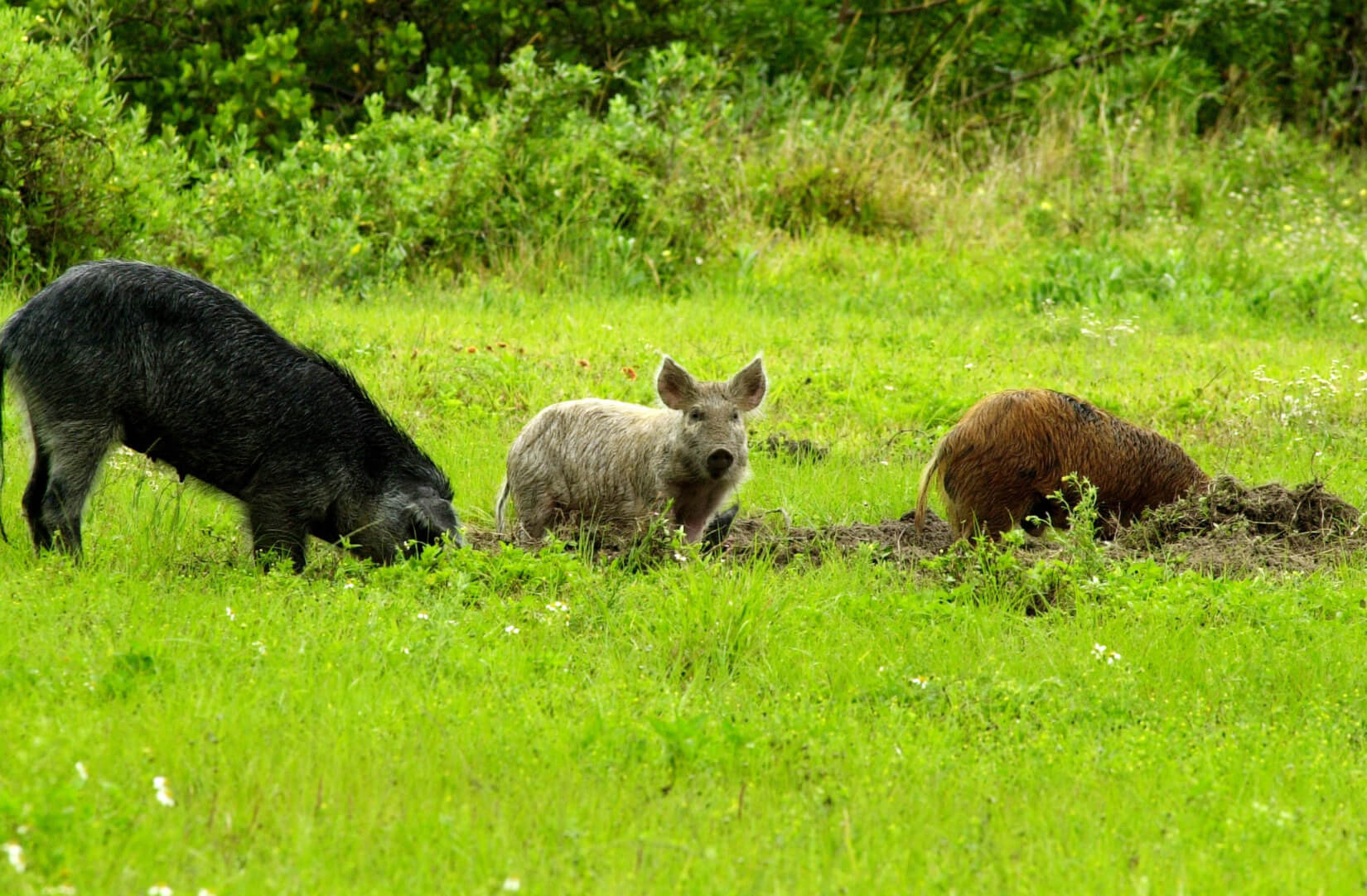Viewpoint: Activists hurt farmers by fueling public’s disconnect with modern agriculture
by Joan Conrow, Genetic Literacy Project, March 29, 2019
While driving on Kauai’s Kuhio Highway in the pre-dawn hours, I came upon a large sow and four piglets, all dead alongside the road just north of Anahola, apparent victims of a vehicular collision.
I’d never encountered quite that scale of porcine carnage, but it underscored the message I’ve been getting recently from Kauai farmers: wild pigs are causing ever more damage to their crops.
Just the day before I’d sat with a farmer at twilight and watched several sows and as many as 20 piglets meander through a valley where he’s growing crops. Earlier, we’d spotted fresh scat beneath fruit trees. He wanted to trap the sows, but didn’t want their orphaned piglets running loose on his farm, frightened and slowly dying of starvation. So he’d been waiting. But pigs are fecund, and he was constantly discovering a new batch of young piglets before he could trap the sows.
He’d fenced as much as he could, as had a flower farmer down the road, who said he’d spent thousands of dollars on sturdy hog wire to keep the pigs from uprooting his tropical flowers and devouring the corms, setting production back a year or more. But they were continually busting new holes in the wire.

Kauai farmers aren’t the only ones suffering. Wild pigs are now a worldwide problem, damaging crops in Italy, Sweden, the UK, the US and elsewhere. And as AgWeb reports, they also destroy native flora and fauna and carry diseases that can spread to domestic swine. Researchers in Scotland are trying to genetically engineer resistance to one of the worst swine diseases, but given the fury of the anti-GMO movement, it’s unclear whether GE pigs could ever make it to market.
Meanwhile, Kauai farmers also tell of crop damage caused by birds, ranging from endangered nene, coots, gallinue and stilts to introduced rose-ringed parakeets. Another told of a new plant disease that was slowly destroying his tropical fruit trees.
On Maui, Upcountry farmers told of damage from deer, and baffling changes in the weather that are making it increasingly difficult to grow the crops they’ve been cultivating for years. They were uncertain whether the changes were permanent or temporary, making it hard to decide whether to switch to other crops.
And everywhere, there is evidence of the gentrification that is taking farm land out of production and driving up the cost of ag land to the place where it’s no longer feasible to use it for its zoned purpose.
Indeed, the most expensive property in Hawaii is a $70 million house on North Shore Kauai ag land that skyrocketed in value when the Kauai County Council decided transient vacation rentals were an acceptable use on farm land. In this case, the place rents for $10,000 per night.

No farmer can compete with that, even when Hoku market is selling organic local carrots for $4.50 per pound.
The mainland is seeing its own problems as farmers retire or die and land is sold for gentleman estates, exclusive hunting retreats and other recreational uses.
Drought, excessive rain, insect pressure, predation, plant disease, labor shortages and a dizzying array of new food safety regulations and other laws are making farming increasingly difficult. Farmers tell me they stick it out because they have a passion for agriculture; they love the lifestyle and in some cases, want to continue a family legacy.
Meanwhile, they’re increasingly frustrated and dispirited by having to deal with the demands and unrealistic expectations of a public that is growing ever more distant from the realities of agriculture. Not to mention groups like Center for Food Safety and Pesticide Action Network that are trying to use food production as a weapon for forcing political and social change.
Which is why we have food writer Mark Bittman — identified as a Center for Food Safety “friend” — making asinine proclamations like these:
Recognize racism, poverty, and inequality as underlying causes of all our food problems.
Really? And production issues — not to mention the ignorance and expectations of people like Bittman and his pals at CFS — don’t even factor into the equation?
Bittman is one of the food activists who believe that everything will be rosy if only we convert to organic, with no thought as to how that will affect production or prices. And they’re mum about how social justice will be achieved by requiring ever more people to engage in manual farm labor — work now performed predominantly by poor immigrants.
He writes of a campaign trying to pressure the “New York City Council to make free and healthy school meals available to all public school students in the city, regardless of income,” without mentioning how anti-GMO activists pressured NY schools to stop using any genetically engineered ingredients, even though a ban was estimated to increase lunch costs by 7 percent.
If Bittman, et.al., truly believe that “farming should happen in harmony with the environment,” then why are they fighting genetic engineering, which offers tools for growing food in a more environmentally sustainable manner, with fewer pesticides, less nitrogen fertilizer, less tilling, less water and higher yields?
And if they’re so concerned about social justice, why are they trying so hard to prevent farmers in developing nations from accessing agricultural technology and innovation that can help them produce sufficient yield to escape poverty?
Bittman writes:
The food justice movement—despite its disparate constituencies—stands for the principle that people should have the right to shape their food environment.
Yeah, they should have that right — if they are willing to get out there and do the hard, dirty, perilous and uncertain business of producing food.
Otherwise, you get clean-handed elites like Bittman — and Center for Food Safety — trying to dictate the terms of a system they do not understand or participate in, other than as privileged consumers who can afford local organic carrots at $4.50 per pound while pretending they give a rat’s ass about the fate of the hungry and poor.